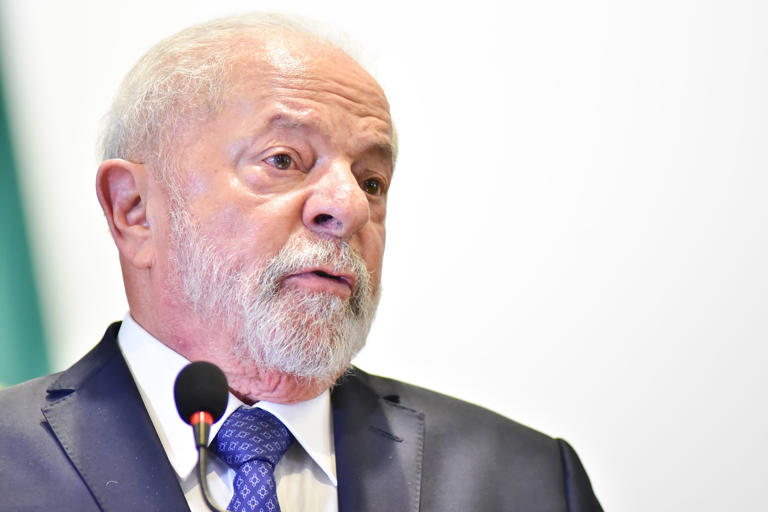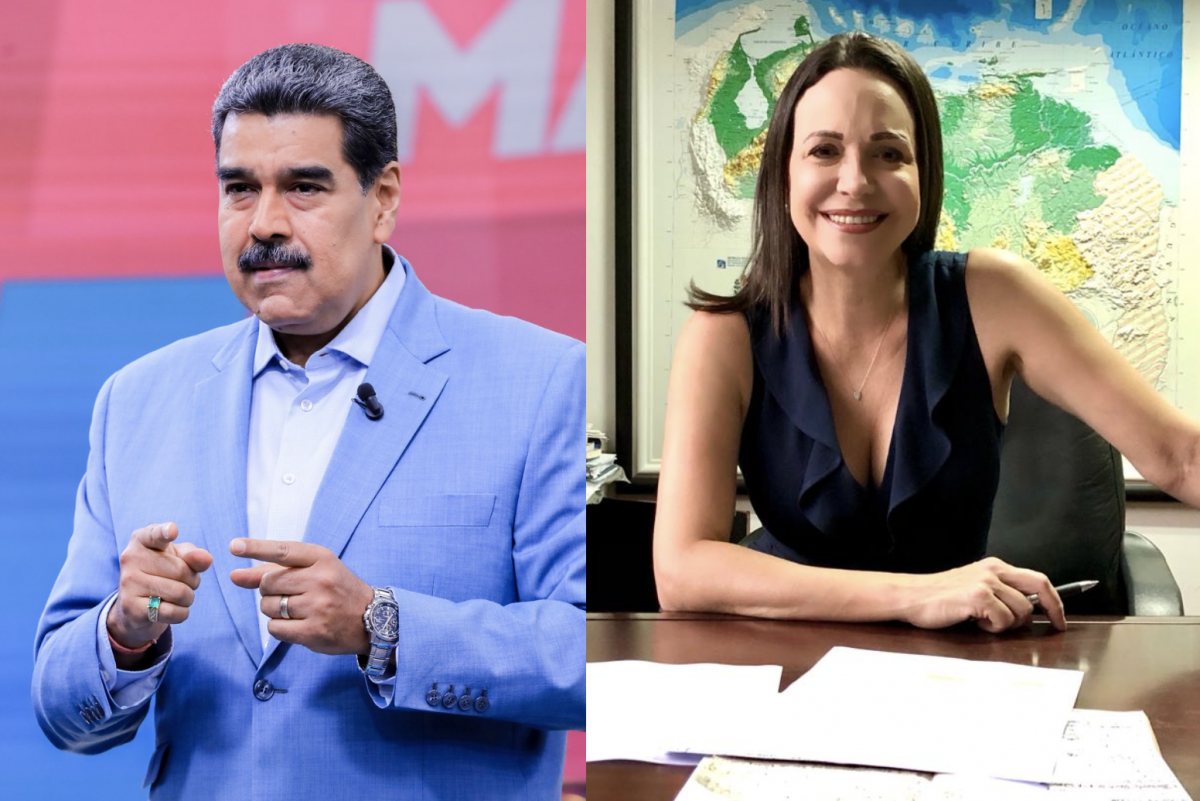www.aljazeerah.info
News, July 2023
Archives
Mission & Name
Conflict Terminology
Editorials
Gaza Holocaust
Gulf War
Isdood
Islam
News
News Photos
Opinion Editorials
US Foreign Policy (Dr. El-Najjar's Articles)
www.aljazeerah.info
|
Editorial Note: The following news reports are summaries from original sources. They may also include corrections of Arabic names and political terminology. Comments are in parentheses. |
Brazil's Lula Vows to Grow Mercosur Despite the Argentina Crisis and Paraguay Opposition to Accepting Venezuela, Due to the Issue of María Machado
July 5, 2023
 |
 |
|
Brazil President Luiz Inacio Lula da Silva, file, July 4, 2023 Bloomberg |
Venezuelan President Maduro and opposition leader Maria Machado, file, July 4, 2023 |
Brazil’s Lula Vows to Grow Mercosur Amid Uruguay Flak, Argentina Crisis
Story by Martha Beck
(Bloomberg) --
Brazil’s plans to strengthen and expand the Mercosur trading bloc are running into growing disagreement among its members over several topics, including Venezuela and free trade agreements with other markets.
President Luiz Inacio Lula da Silva assumed the rotating presidency of the South American customs union Tuesday, promising to reduce dissent in the group founded by Brazil, Argentina, Uruguay and Paraguay. His push for Mercosur to resume talks with Venezuela, suspended from the bloc in 2017 for breaching its democratic clauses, faced immediate backlash.
Uruguay’s Luis Lacalle Pou and Paraguay’s Mario Abdo Benitez criticized the Venezuelan government’s decision to bar opposition leader Maria Corina Machado from running in upcoming presidential elections, putting Lula on the defensive.
“I follow the events in Venezuela with great concern,” Benitez said during a Mercosur summit in the Argentine city of Puerto Iguazu. “Erasing the opposition with the disqualification of Maria Corina Machado collides with human rights.”
Lacalle Pou echoed him: “It is clear that Venezuela will not have a healthy democracy if, when there is an election possibility, a candidate like Maria Corina Machado, who has enormous potential, is disqualified for political reasons.”
Lula, a longtime ally of Venezuela’s Nicolas Maduro, said he still didn’t have a full picture of Machado’s situation in Venezuela, but called on his colleagues to remain open to dialogue: “When we have problems, we don’t hide from them, we face them,” he said.
Argentina’s Alberto Fernandez also adopted a more diplomatic tone, saying he wants “democracy to be full and institutionality to be maintained in Venezuela,” but that he first needs to “see exactly what the size of the problem” is in the country.
Machado’s ban, like those slapped on other leading opposition figures including former governor and twice presidential candidate Henrique Capriles, is an attempt by the Maduro administration to keep her out of next year’s race. In practice, however, she and other candidates are ignoring the bans and continuing their campaigns, betting the government will eventually be forced to reverse its decision.
EU-Mercosur Deal
Lula also said he seeks to include Bolivia in the while working for the conclusion this year of a long-awaited free trade deal with the European Union, which was reached in 2019 but has never been finalized.
Earlier, Lacalle Pou complained about Mercosur’s inability to strike trade deals with other markets, especially the European Union, while it blocks his country’s plan to sign a bilateral agreement with China.
“Uruguay has struggled to get market access as our economy’s share of Mercosur trade has decreased,” he said. “We must keep negotiating as a bloc and, if not as a bloc, unilaterally.”
Read More: Uruguay Steps Up Criticism of Mercosur at Argentina Summit
Accessing the Argentine consumer market is among the main complaints voiced by Uruguay, as the second-largest economy in South America raises obstacles to imports in a bid to protect its dwindling international reserves.
Uruguay did not sign onto the statement released by the bloc of countries at the end of the summit, the fourth time it has left its name off the declaration.
“We’re going to have to make a huge effort to try to reduce complaints among us,” Lula said. “If it lasts a long time, a complaint becomes bitter, unpleasant. I will try to resolve the main disagreements in Mercosur, as together we are stronger and we have more negotiating power.”
***
Venezuela’s Maduro Denounces US-EU Meddling Ahead of 2024 Presidential Race
Edited by Ricardo Vaz in Caracas.
Mexico City, Mexico, July 4, 2023 (venezuelanalysis.com) –
Venezuela rejected external “interference” after US and EU officials spoke out in defense of far-right opposition leader María Corina Machado.
Venezuelan President Nicolás Maduro accused the United States (US) and the European Union (EU) of seeking to “sow the deadly poison of fascism” in the country after senior officials spoke out against the political disenfranchisement of far-right opposition leader María Corina Machado.
"They want to sow the deadly poison of fascism, of hatred, of confrontation among everyone, through social media, paying millions to sow hatred, to try to put their claws on our country and hand it over to the US empire and to the old European racists and colonialists," denounced Maduro Monday during his weekly television program.
The Venezuelan president's comments came on the heels of a Monday statement from the EU High Representative for Foreign Affairs and Security Policy Josep Borrell who rejected the disqualification of Machado.
In its statement, the EU expressed its “deep concern” over the decision to bar Machado from holding political office, alleging that it would “undermine democracy and the rule of law and will only deepen the longstanding political and social crisis in Venezuela.”
In its own statement, the Venezuelan government rejected what it categorized as a “new act of interference” by the EU. In a separate communique, the government also denounced a statement by the US.
“The robust participatory and protagonist democracy of Venezuela neither requires nor accepts the tutelage of other nations, much less from indirect democratic systems and with severe restrictions on participation,” read the Venezuelan government statement. It went on to point the finger at the US’ political system for being plagued by “economic interests and institutionalized racism.”
Machado—who gained international prominence after being hosted by then US President George W. Bush in the Oval Office in 2005—is seeking to represent the opposition in the 2024 presidential race. Venezuela’s hardline opposition has sought to abandon its abstentionist strategy and is instead independently organizing a primary contest to select a unified candidate, marking a shift in strategy after years of pursuing regime change in Venezuela via unconstitutional means.
Venezuela’s Comptroller General suspended Machado’s political rights in 2015 after the far-right leader neglected to disclose the full extent of her earnings during her term as a congresswoman. Machado was elected as a lawmaker for the 2011-2016 legislative session but lost her seat after she illegally accepted the position of a Panamanian diplomatic representative in order to address the Organization of American States, an act prohibited by the Venezuelan Constitution.
The far-right opposition figure was likewise a supporter of the so-called “interim government” that sought to usurp the presidency as part of a US-led regime change effort to oust the Maduro government. However, she never officially formed part of the Juan Guaidó-led “interim government”.
Congressman José Brito, a representative of an opposition sector that broke with the Guaidó camp in 2019, requested an update on Machado’s political status from the Office of the Comptroller General. Through a statement shared by Brito, Venezuelan authorities confirmed the political disenfranchisement of Machado on Friday.
Machado’s ban has become a rallying cry for far-right politicians in the region, with figures such as Bolivia’s Luis Fernando Camacho, Brazil’s Sergio Moro, and US Senator Rick Scott expressing their sympathies with the far-right Venezuelan politician.
Machado, who has previously called for further sanctions on Venezuela and endorsed a foreign military intervention, is leading opinion polls in the opposition’s primary race. Henrique Capriles and Freddy Superlano, two rivals in said race, are also barred from holding office. The so-called “National Primary Commission” has stated that it will not proscribe disenfranchised politicians from running in the primary.
Machado, who classified her struggle as a “spiritual fight between good and evil” in a press conference, has vowed to press on with her candidacy despite her disqualification. It is not clear how Venezuela’s authorities would respond should she win the primary and become the opposition’s candidate. Venezuela’s electoral authority, the National Electoral Council (CNE), is in the midst of a renewal of its board after several members resigned in June. Machado’s inclusion on the ballot in 2024 would have to come as a result of a political negotiation that would see her political rights restored.
Venezuela’s Maduro Denounces US-EU Meddling Ahead of 2024 Presidential Race | Venezuelanalysis.com
Fair Use Notice
This site contains copyrighted material the
use of which has not always been specifically authorized by the copyright
owner. We are making such material available in our efforts to advance
understanding of environmental, political, human rights, economic,
democracy, scientific, and social justice issues, etc. We believe this
constitutes a 'fair use' of any such copyrighted material as provided for
in section 107 of the US Copyright Law. In accordance with Title 17 U.S.C.
Section 107, the material on this site is
distributed without profit to those
who have expressed a prior interest in receiving the included information
for research and educational purposes. For more information go to: http://www.law.cornell.edu/uscode/17/107.shtml.
If you wish to use copyrighted material from this site for purposes of
your own that go beyond 'fair use', you must obtain permission from the
copyright owner.
|
|
|
|
||
|
||||||


